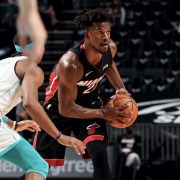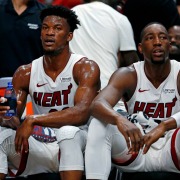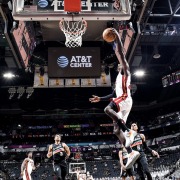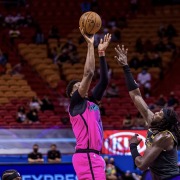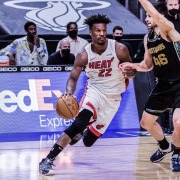Why Is the Miami Heat’s Press So Effective?
When a team claims that their overall identity is on the defensive end, it’s always important to check out their tendencies on that side of the floor, aside from the numbers that place Miami at 8th in the NBA in defensive rating.
For one, a defensive player of the year candidate, Bam Adebayo, at the forefront of Miami’s defensive success is a good starting point. Not many centers are placing themselves into every spot on the floor every night, but Adebayo is one of them.
Back-side help when he notices a mismatch on a smaller defender, the constant switching onto the perimeter to lock up any guard or wing, and many more areas that stand out. But ultimately, it wouldn’t be possible without two of his counter parts, Jimmy Butler and Trevor Ariza.
Speaking of backside help, the reason he is able to freely roam on many possessions is due to the confidence he has in these two guys to step up or double. And these descriptive layers are interesting considering the fact that this team didn’t seem to have the personnel to compete on that end of the floor to begin the year.
Instead of focusing on individual abilities, though, it’s essential to evaluate the defensive adjustments that seem to be awaiting in Erik Spoelstra’s pocket. That is headlined by the 2-2-1 press and 2-3 zone that are utilized in spurts when this team needs a boost.
The most crucial part about this adjustment isn’t the press itself, but actually the timing of it. In the Heat’s win over Charlotte on Sunday night, Coach Spoelstra threw it at them when they began to get into their usual fast-paced flow, which allowed Miami to flip the script.
The purpose of the press isn’t to just get steal after steal, even though Miami is hoping for that result. It’s actually to put pressure on a team, either speeding them up as they’ve done in the past, or slowing them down as they did last night against Charlotte.
On this play above, LaMelo Ball is able to push the ball up the floor to Terry Rozier as Andre Iguodala and Ariza are pressuring full court, which is quite the defensive duo. Charlotte went from controlling the pace of the game as the team ranked 4th in assists per game to a possession like this.
Ball to Rozier to Ball to Rozier to Ball in a span of eight seconds. Forcing teams to play hot potato on the perimeter leading to a contested three is exactly the reason Miami throws it at teams unexpectedly.
I asked Jimmy Butler about the effectiveness of the press and zone, as well as the timing of using it, and he responded, “It is very effective. I felt like we threw different types of defenses at them throughout the entire game, but we were locked in on where everybody was on the floor…Being able to mix and match these defenses can really throw people off.”
And well, that last part pretty much sums up last night’s game, since although the all-around scoring seemed to be the headliner, the way Miami forced Charlotte into the unknown every offensive possession was what actually stood out the most.
Another aspect to the usage of the press is when it is utilized against Miami. Usually teams that use certain defenses at a high rate are more likely to be better at breaking it down, but this is a unique season. The lack of practice time means that Miami doesn’t get the same amount of time on breaking down a press, since their time to figure it all out has been in-game adjustments.
But Miami has shown to do a great job of breaking it down in the limited possessions it has been thrown at them. On this play, Goran Dragic bounces it to the middle for Adebayo, which the next thing coming is usually the swing to the wing. Rozier knowing that predicts the pass and cuts off Max Strus, allowing Adebayo to do what he does best: put the ball on the floor and get downhill.
Bismack Biyombo steps up and Adebayo shovels it to Butler on the baseline, leading to two points. After Miami began to punish them on these possessions, Charlotte was forced to back out of it rather quickly.
When I asked Bam Adebayo if their comfort levels against the press have anything to do with them utilizing it nightly, he said, “We gotta be able to adapt, so when they went into the press, just try to put one man in the middle and tell him to go. When we’re in that situation, there is no play to run, you play off instincts and let talent be talent.”
The funny thing about his description is that he’s describing it in general terms, but it really reflects back onto himself. Just like in the play above, he’s the one guy in the middle who is forced to go, and that’s who Miami wants with it whenever it’s thrown at them.
Another intriguing element to his response is when he mentioned letting “talent be talent,” since those open court opportunities honestly do just that. And frankly, they allow Bam Adebayo to be Bam Adebayo. No team wants to see him moving downhill in the open court, which is why I wouldn’t expect to see much press being thrown back at Miami moving forward.
These two defensive sets aren’t the only thing that can be thrown at teams as a surprise, since I can guarantee that Miami has something up their sleeve in a playoff setting to throw teams off a bit. Maybe that surprise defensive gem is Victor Oladipo, or possibly an Adebayo-Dedmon tandem, but either way it’s going to be something, and the press and zone is quite the introduction to that.
